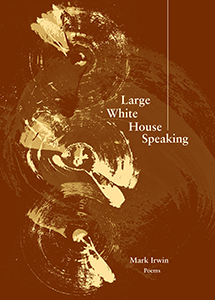Book Review
The first time a ghost formally appears in Mark Irwin’s Large White House Speaking is on page 22 in the poem, “Ghost,” though arguably the haunting beings much sooner. The collection is a quiet yet forceful meditation on the porous borderland between the life of the human and its ghostly absence. In a word, the collection is preoccupied with ghosts; with haunting, which is to say the collection is preoccupied with those moments when the material and metaphysical worlds make contact, igniting a new vision. The stain left behind by this touching is the driving force of the collection, the almost singular focus of the poems comprising it. In fact, we feel this preoccupation as early as the first poem “On Sunday, sometimes,” when our speaker remarks:
…I’ll open the photo album and descend
into its cellar where people are walking toward me, out from
the white chancel of each picture, behind which a mountain
looms, all of its snow melting.
Nimble and swift, Irwin’s poems seep into the spaces where the human and spirit worlds touch edge to edge. That our speaker can understand a photo album as a doorway through which she may pass and mingle with long gone figures and the vastness of a winter mountain helps establish the oft-repeated theme of the physical and metaphysical worlds meeting through the human: a meeting that is sensate, communicating to the human in a shared vocabulary.
More than just a creature of supreme perception, the speaker of Irwin’s poems is able to breach such divides while remaining wholly in the physical world. There are portals a-plenty in this collection—an ordinary windowpane, a museum display, the corners of a bedroom mirror; all draw our speaker into a haunting, a return to the library of familiarity, the routine of a bedroom giving way to the awareness of a newly perceptible universe:
…The mirror sometimes rings, as though a bell
or coins were falling within its inner plates slowly
shifting, barely growing, creating fissures within the silver
here something the color of dried blood faintly scores the surface, where fires invisibly burn in the swirling snow…
Here, the influence of the metaphysical serves to reflect the speaker’s world more deeply, to make it more felt and differently. But it’s wrong to see these poems only as domestic elegies, as testimony to the transience of memory and all the vain effort love requires. With all the power it takes to conjure both the bride and her babe, it’s natural and right to recognize that the human makes an indelible mark on her world; but it’s not just through memory that people return to us. The creation of a self guarantees its eventual return and the body is a talisman, most certainly.
The poem “Lucy” presumably refers to the several hundred pieces of bone that comprise the first significant Australopithecus afarensis skeleton ever found, once thought to be the missing link in the evolutionary chain:
For the most part you were there, with the notable
exception of a right femur, left tibia, and part of the skull. No hands or feet. I
guess
they were shattered and lost in your swim to the surface of three million years.
Next
to me a pregnant woman was looking down to where one pelvic bone and the
sacrum
stood, and for a moment she touched her hand to my shoulder as we both gazed
down
farther into a white fire…
And there we have (ostensibly) the first human being born into the present moment, midwifed by our speaker and the daily museum crowd. The speaker is in a constant state of return—to people, to moments—the act of which is at the core of the word “haunting,” from the French hanter—“to frequent or return to.” In this sense, the influence of haunting and ghosts in this collection is markedly different from the influence of the supernatural more broadly. These are not poems about ghosts or the experience of haunting by loss, though absence plays a principal role. Rather, these poems bear witness to the many forms of return, to the totality of human experience as something that must also be about the connections we may make across vast and mystical distances in order to be true.
In Irwin’s poems, humans, as subjects of the physical and metaphysical worlds, are permitted to change forms by occupying many bodies—a specific body at many times, even a former body. In “Portraits,” our speaker cleans the same window with her mother—child washing inside, mother washing outside. The mother remarks:
This is what it was like
when you were inside me, she said. What? I asked,
though I understood.
And this implicit understanding of the duality of the world as practical and physical, knowable and mystical, at once and without contradiction, is at the heart of Large White House Speaking. Driven more by a simmering undercurrent of topic than form or principle of organization, these poems are frankly endearing in their fidelity to the lyric as an able expression of complex truths.
Posted 4/16/2014
About the Reviewer
Meg Barboza's poems have appeared in 1913, jubilat, Little Red Leaves, New American Writing, P-Queue, and VOLT among others. Originally from Hudson New York, she now lives in Brooklyn and works for the New York City Department of Education
